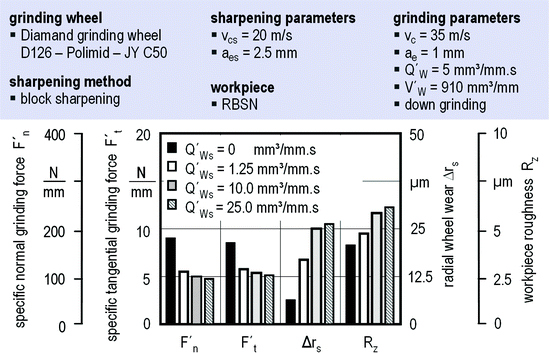
Breaking News
Main Menu
Winterthur Grinding Handbook Definition
пятница 05 октября admin 69
How to select a grinding wheel? Short, general answer. Depends on many variables. The most basic in general: *The harder the steel (material), the softer the wheel. *The more stock to remove, the coarser the wheel. *The finer finish required, the finer the grit.
Grinding is done between two disks, one of which is stationary and the other revolving at high speed. Grinding is the process of removing the surface of a hard material using a.
*The sharper internal corner desired, the harder and finer the wheel to do just the corner. To go much beyond that, you would need to be specific as to material, machine, etc. One thing to keep in mind. A grinding wheel is basically thousands of little cutters the same as other machine tool cutters. Many of the same rules apply to both. You shouldn't have any trouble with the 410 but the aluminum will give you heartburn.
It will want to collect in your wheel and eventually fly off in chunks and even take some or all of your wheel with it as well as leave ugly scars in your workpiece. One way to alleviate this condition is with liberal doses of beeswax to the periphery of the wheel.
Beeswax used to be available in stick form from many industrial suppliers. Can't tell you if it still is. Keep applying it as you grind. It wants to melt as it gets heated.
If you don't have variable speed use a small diameter wheel. Less heat is generated. I'm assuming you're dry grinding. Don't know much about wet grinding. If you're wet grinding, straight honing oil might be better than mixed coolant. Thats a guess.
Slim shady lp songs. The political, patriotic “Like Home (feat.
It's great to have a separate grinding forum. I've done some plain Jane surface grinding and been around some pretty good mold makers/grinder hands but have never picked up a very good knowledge base. In the home shop, I have a Boyar-Schultz 6x12. I do all my grinding dry. So The first question: what is a good all-around wheel for softer steels: unhardened O-1, 4140 PH, and cold-rolled? Secondly, like VSMI I also have a project that calls for grinding 6061 aluminum so I'm also looking for tips/wheel selection advice on that. Lurk mode off.
Novice question here, but the selection of wheel is said to be determined by (among other things) the hardness of the steel being ground. So to be sure I'm getting the concept, the idea is that one would choose a different wheel for steel that is not heat treated, such as ordinary cold rolled steel, or leaded steel, and then a different wheel when the steel is high carbon steel that has been heat treated - and that further the wheel grade might be further influenced by the rockwell number of the steel being worked on. Is this a fair approximation of the idea? Jim Lurk mode on.
I like Winterthur wheels in the OD Grinding area. We use a 53A and cuts 416ss and 4340 very well. Font thai sarabun psk. This wheel will cut 17-4ph @H900 and does just okay on 303ss. ID grinding wheel we like Cincinnati Wheels that are a Ruby/Aluminum Oxide. They cut 304ss pretty good. The parts still gets warm but it does better than any others we have tried.

Centerless Grinding Wheels, I like two different wheels 22A Cincinnati Wheels and WZ100 Jowitt Rodger. The Jowitt is a Resin type wheel and it works great on thin walled tubing.
Now for SG wheels from Norton, I really don't like the wheels for anything but Surface grinding. A ceramic wheel takes to much wheel pressure to make a cut correctly. That is why it works well on surface grinding but you can't put a lot of wheel pressure in a OD or Id application. I need to surface grind some 6061T6 aluminum and 410 stainless assemblies such that a pocketed stainles insert must be flush with its aluminum housing, and all must be flat to 0.0003'/ft. I've talked to two different Norton folks and got different answers, and neither made me feel very confident in their recomendations.
There is about twice the amount of stainless to grind than aluminum. What do you think?? 12:00 AM I have ground a fair amount of non ferrous material (aluminum, bronze) and use a silicon carbide wheel from Norton (37C black stone variety) with liberal amounts of WD40 as a cutting fluid but never when it was married to a dissimiliar metal but I would try it if it were mine. Also for selecting types of wheels, when i grind core pins on the surface grinder i plunge grind and, i find the shorter the contact area the harder the wheel needs to be, even if its 50 RC, i use 60k whenever i have less than.25 of the wheel tounching.